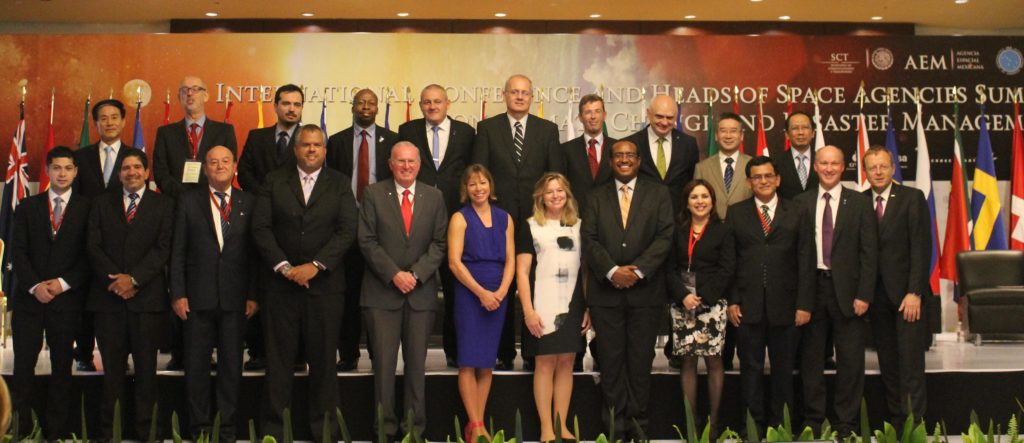Heads of Space Agencies Summit
Washington DC, USA
November 17, 2010
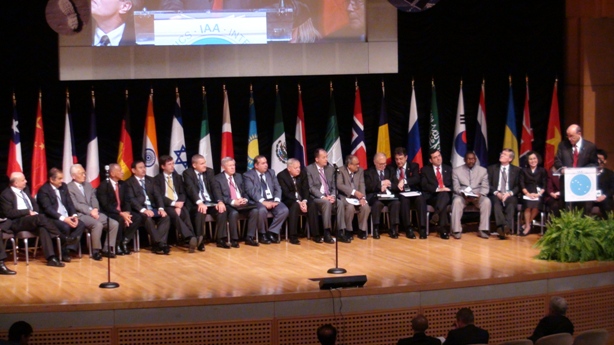 Heads of Space Agencies during the reading of the Summit declaration by IAA Secretary General, Dr. Jean-Michel Contant
Heads of Space Agencies during the reading of the Summit declaration by IAA Secretary General, Dr. Jean-Michel Contant
THE INTERNATIONAL ACADEMY OF ASTRONAUTICS HOSTED LANDMARK HEADS OF SPACE AGENCIES SUMMIT IN WASHINGTON, D.C. ON THE OCCASION OF ITS 50TH ANNIVERSARY
– Four IAA studies
– IAA Summit Overview and Goal
– IAA Summit Declaration
– Head of Space Agencies speeches
– Gala pictures
Four IAA studies – In Preparation for the Head of Space Agencies Summit:
In anticipation to the Head of Space Agencies Summit four studies have been prepared in less than one year by the International Academy of Astronautics. The studies have been presented during the morning program by the study group leaders and discussed during breakout sessions. The IAA studies are available here:
Presentation of the four IAA Studies during the Summit:
|
Human Spaceflight Dr. Giuseppe Reibaldi Dr. Scott Pace |
Planetary Robotic Exploration Dr. Gregg Vane |
Climate Change Mr. John Mankins Mr. Max Grimard |
Disaster Management Dr. Ranganath Navalgund Dr. Valery Menshikov |
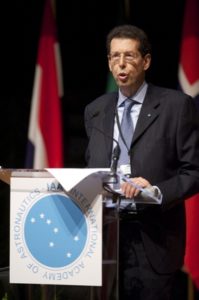 |
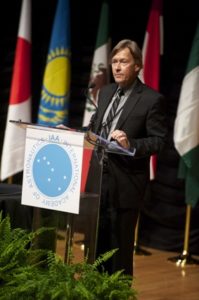 |
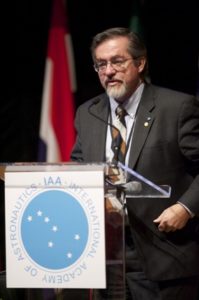 |
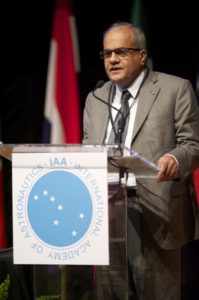 |
|
Acad. Giuseppe Reibaldi |
Acad. Gregg Vane |
Acad. John Mankins |
Acad. Ranganath Navalgund |
The Academy, an independent organization, was founded in 1960 and led by some of the most famous space pioneers such as Von Karman, Oberth, Von Braun, Halley, Van Allen, Keldish, Sänger, Draper, Mueller, Gagarin, Armstrong, Aldrin, Sedov, Broglio, Curien, etc. On the occasion of its IAA 50th anniversary, a “Heads of Space Agencies” Summit was held on November 17, 2010 at the Ronald Reagan Building and International Trade Center in Washington DC USA, with the primary support of Lockheed Martin Corporation and supporting sponsorship from EADS Astrium and Space News.
The goal of the 2010 IAA Summit was to reach a broad consensus on international cooperation and coordination at the highest level and consider new concrete initiatives of cooperation in the four areas identified by the IAA Board of Trustees: (i) Human Spaceflight, (ii) Planetary / Lunar Exploration, (iii) Disaster Management / Natural Hazards, and (iv) Climate Change / Green Systems. It is the Academy intent to avoid any duplication of on-going efforts (e.g., Global Exploration Strategy, Group on Earth Observations) but rather to foster closer and broader international coordination across the four topics areas to strengthen the effectiveness and support of global space activities.
IAA Summit Achievement:
The Summit gathered:
– 30 Heads of Space Agencies along with
– 500+ Academicians, world leaders and experts.
All heads of agencies have welcomed the IAA SUMMIT DECLARATION (AVAILABLE HERE) and highlighted the need to foster closer international cooperation across four topic areas to strengthen the effectiveness and support of global space activities. This declaration was the result of 8 months of preparation coordonated by the Summit Program Manager Mrs. Corinne Jorgenson.
Heads of Space Agencies Summit: Final Program (available here)
Exerpts of Heads of Space Agencies speaches
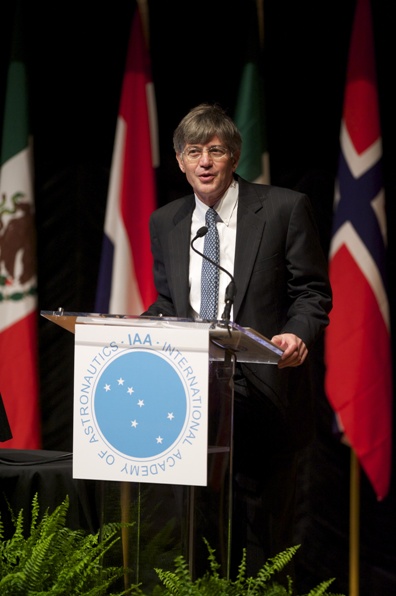 Mr. James Steinberg, Deputy Secretary of State representing Mrs. Hillary Clinton Secretary of State of the United States
Mr. James Steinberg, Deputy Secretary of State representing Mrs. Hillary Clinton Secretary of State of the United States
Academician Dimitru-Dorin Prunariu, Chair of the UN COPUOS: “Distinguished audience, I’m the 103rd human who have the special privilege to orbit earth beyond its atmosphere. The human space flight became part of my life and one of the most important things of my scientific approaches. As Chairman of COPUOS I will have the great privilege next year to chair the committee during the celebration of the 50th anniversary of the first human space flight…… I believe that follow-up summit activities are highly beneficial and recommended and I encourage IAA to take it into consideration”.
Welcome Message by:
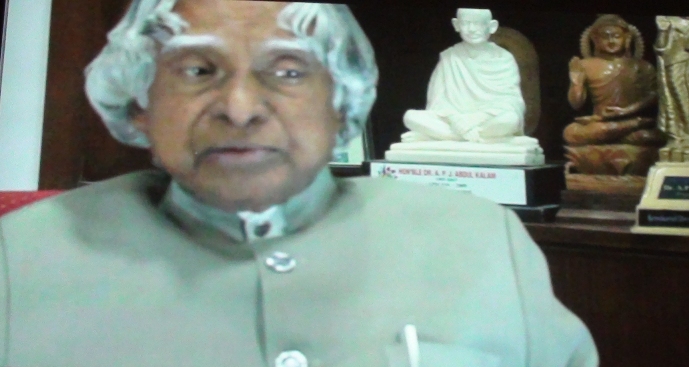 IAA Academician Abdul Kalam, former President of India welcoming the summit (via video message)
IAA Academician Abdul Kalam, former President of India welcoming the summit (via video message)
Summit Introduction speech by:
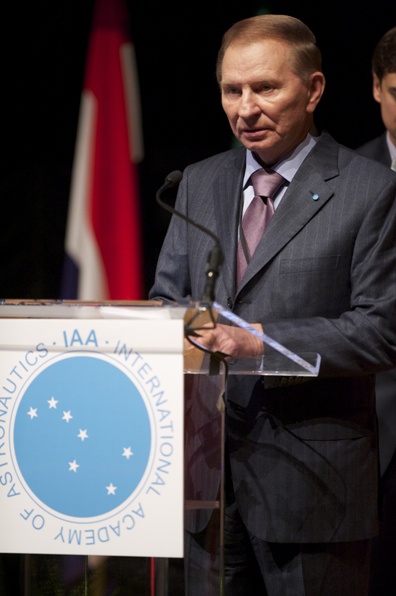 IAA Academician Leonid Kuchma, former President of Ukraine
IAA Academician Leonid Kuchma, former President of Ukraine
Summit Moderator
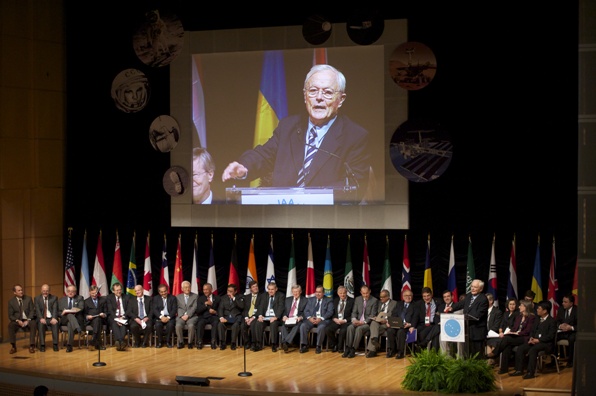 IAA Academician Walter Kroell, former Head of the German Space Agency (DLR)
IAA Academician Walter Kroell, former Head of the German Space Agency (DLR)Heads of Space Agencies Welcoming the IAA Summit Declaration
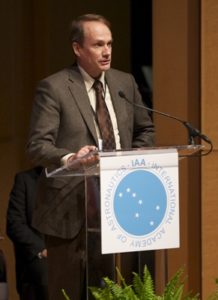
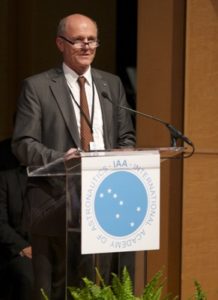
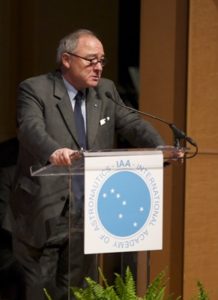
Dr. Steve MacLean, President, Canadian Space Agency – IAA Academician Jan Kolar, Director, Czech Space Office – IAA Academician Jean-Jacques Dordain, Director General, European Space Agency – from left to right
Dr. Steve MacLean, President, Canadian Space Agency: “From 50 years ago, from a modest beginning, but through the vision of a few pioneers associated with the early days of space, to today, with approximately 1,200 full and corresponding members, including most of the world’s expert practitioners in all domains of astronautics, the IAA has come a long way, and has materially advanced the cause of space over its distinguished history. I note with satisfaction that the activities sponsored by the Academy have in recent years multiplied and spread to all regions of the globe, providing a reach of the Academy and of Astronautics to at least 80 countries. This is a credit and a tribute to the current President and the Board of Trustees, and all those that have gone before them, and I offer you my congratulations, and many of you are in the room today. I also note with satisfaction the declaration that has been prepared by the IAA President, the Secretary General Dr. Jean-Michel Contant, and the tireless efforts of the Summit Program Manager Corinne Jorgenson, working through the distinguished members of the Academy. The topics of human space flight, planetary robotic exploration, climate change, and disaster management are four of the most challenging yet ultimately rewarding areas where space can and must play a role in leading humankind into the future”.
Academician Jan Kolar, Director, Czech Space Office: “Dear Dr. Nair, Dear Dr. Contant, distinguished colleagues, heads of space agencies, ladies and gentlemen, I am extremely pleased and honored to be part of this outstanding meeting, which the Summit of Space Agencies certainly is. With congratulations to the 50 anniversary, I would like to thank to the International Academy of Astronautics and its staff for their initiative and effort to organize this event, and also for giving the Czech Space Office an opportunity to participate in it. Gathering of this kind provides rather exceptional environment for efficient exchange of views among people engaged directly and with respective measure of responsibility in space activities and related space policy on the national level and international cooperation. Results and also some agreed recommendations for perspective next harmonised steps are recorded in the declaration presented. We welcome the document and we see it as useful basis for enhancing global collaboration in space and important part of the process aiming in hopefully concrete actions and beneficial projects. The Czech Space Office supports recommendations proposed in the Declaration as we can find a lot of common with orientations proposed in our national space plan”.
Academician Jean-Jacques Dordain, Director General, ESA: “it’s a good opportunity to reflect on what we can do more and together for making the future on planet earth possible. I would like to thank also the IAA Steering Committee and the IAA study groups for their work, for their dedication and recommendations, which will be very helpful for all of us. I am also welcoming the declaration, which has been drafted for the summit, and the four topics of the declaration, Disaster Management, Climate Change, Human Spaceflight, and Planetary Robotic Exploration are all priorities of the ESA member states since years, and for which ESA is cooperating already with a lot of international partners, who are all represented here. Europe is involved in the robotic exploration of our solar system since half a century, through missions which have most often been carried out in cooperation with our international partners”.
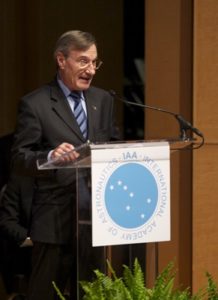
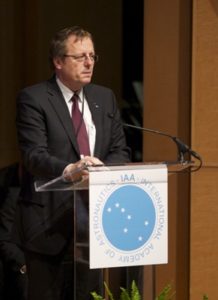

IAA Academician Yannick d’Escatha, President, CNES, France – IAA Academician Johann Dietrich WÖrner, Chairman of the Executive Board of the German Aerospace Center DLR – Dr. Zvi Kaplan, Director General, Israel Space Agency – from left to right
Academician Dietrich Woerner, Chairman of the Executive Board of the German Aerospace Center DLR: “Ladies and gentlemen, we welcome the IAA summit declaration, Space for Humanity. It is a clear statement of the increased significance of IAA for space cooperation. IAA is right now a solid catalyst for international cooperation, and I am personally committed to IAA. In a few weeks, the German space strategy will be published. In this strategy, space will increasingly be evaluated under the aspect of its concrete benefit, concrete benefit meaning technology development and science as well. Another goal within the strategy is to speed up innovation transfer of space research”.
Dr, Zvi Kaplan, Director General, Israel Space Agency: “Dr. G. Madhavan Nair, IAA President, Dr. Jean-Michel Contant, IAA Secretary General, IAA Steering Committee members, Honorable Head of Agencies, distinguished guests, ladies and gentlemen. It is my pleasure and honor to partake at this historic event, “Heads of Space Agencies Summit” and celebrate the 50th anniversary of the International Academy of Astronautics. My sincere gratitude to the IAA Steering Committee and for all those who made this Summit a success…..Albert Einstein was quoted to say:”In the middle of every difficulty lays an opportunity.” Today, all of us have the ability and the drive to transform the world and make it a better place, by augmenting our lives via new developments; influencing and impacting our response to disasters; monitoring the environment, and mitigating of hazardous phenomena occurring frequently due to climate changes, thus, affecting human race future survivability, via new scientific discoveries and achievements”.
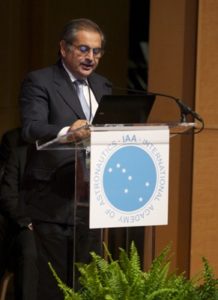
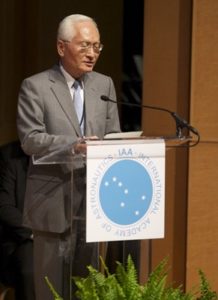
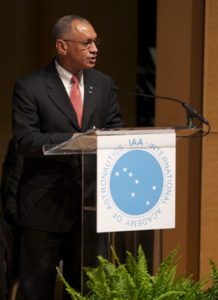
IAA Academician Enrico Saggese, President, Italian Space Agency – IAA Academician Keiji Tachikawa, President, Japan Aerospace Exploration Agency – IAA Academician Charles Bolden, Administrator, National Aeronautics and Space Administration – from left to right
IAA Academician Enrico Saggese, President, Italian Space Agency: “Ladies and Gentlemen, Distinguished Heads of Agencies, Delegates and representatives, before starting let me thank the International Academy of Astronautics for this special event that assembles the majority of the space agencies and space stakeholders and express the ASI support of the IAA Summit Declaration”……..Italy, through the Italian Space Agency, is in the first line in improving space technologies and related services. In particular, we are highly involved in Space Science and Observation of Universe, Earth Observation and Disaster Management, Telecommunication and Navigation, ISS and Human spaceflights. We have just finalized the new national space plan for ten years.
In addition, ASI cooperates with other international public and private partners All data receiving from the different EO missions are collected and processed in a Center of data interpretation located in Italy. The goal is to reach pregnant and sophisticated applications with data fusion and data mining procedures”……”ASI is ready to share data processing experiences with all interested partners or subjects in emergency situations and risks. Thank you for your attention
IAA Academician Keiji Tachikawa, President, Japan Aerospace Exploration Agency: “The symposium on the climate change, which was one of 4 focuses in the declaration, was held in Nagoya, Japan on August 30th and 31st this year, and many concerned people participated in the event. I was glad to hear that active discussions were made under the theme of “What Can We Do for Our Mother Earth?” and action items were adopted, which would be achieved through mutual cooperation of space agencies. JAXA would like to contribute to the resolution of the challenge by developing observation satellites concerning the climate change. In addition, International Space Station is expected to be utilized not only as an international research facility, but also as a platform of geosphere observation and monitoring”…….”I would like to conclude my speech by once again expressing my warm welcome to IAA’s declaration as well as my strong determination that JAXA will further enhance the related activities through cooperation with other space agencies”.
IAA Academician Charles Bolden, Administrator, National Aeronautics and Space Administration: “The race is on. Distinguished participants and guests, it’s my pleasure to be here again with all of you at this unprecedented gathering of space agency leaders from around the world. While the four focus areas addressed in today’s summit represent only a portion of the incredibly work that each of our agencies is doing to effectively utilize space for humanity, I believe they provide excellent examples of what nations can do when working together to achieve common objectives”…….””In summary, my sincere thanks to IAA and Lockheed Martin for making this gathering possible. I look forward to the many missions of space exploration ahead working closely with the agencies represented here today. Thank you”.
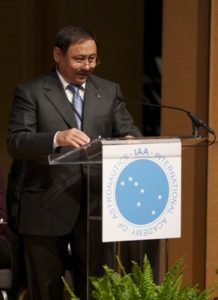

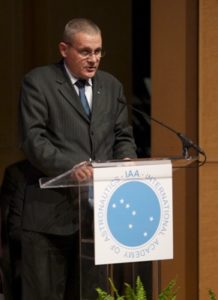
IAA Academician Talgat Musabayev, Chairman, Kazakhastan Space Agency – Dr. Ger Nieuwpoort, Director, Netherland Space Office – IAA Academician Marius Ioan Piso, Chief Executive Officer, Romanian Space Agency – from left to right
Academician Talgat Musabayev, Chairman, Kazakhastan Space Agency: “….As you know, Kazakhstan is a dynamic development country with vast territory and developed mining industry, which creates its own space technology, including the scientific, technical, and human resources. Since 1991, Kazakhstan has developed space research related to man-tended flight, with the continuing support of the president of Kazakhstan, Nursultan Nazarbayev, and close collaboration of scientists and specialists of Kazakhstan and Russia for programs of scientific research and experiment have been accomplished…..During my three space flights totaling in 342 days, there was a carried out of huge amount of scientific, technical, technological, medical, biotechnological, and other experiments based on scientific programs….The Republic of Kazakhstan conducted a national space program which provides the creation of all elements of the production chain from research, the technical operation and commercial exploitation of space technology”.
Dr. Ger Nieuwpoort, Director, Netherland Space Office: “The past 50 years have been years of pioneering in space, giving us many breakthrough technologies. Now we’ve entered a new era, an era in which we can harvest on the achievements of the past, an era in applications of space technology and satellite data are more and more serving society and the military as a whole. To be able to do so in the future, the space sector should be fully integrated into society. We all know that space is essential for answering the needs of our time….Our world is facing challenges. For many of them, the key to a solution comes from space. Technologies are already available in orbit. We can get the most out of it by international collaboration. There we all share a responsibility. Fundamentally, there is already long standing and fruitful international cooperation, but it asks for more if we really are to bring solutions to global needs. Therefore, I welcome the declaration of IAA as an important step”….
Academician Marius Ioan Piso, Chief Executive Officer, Romanian Space Agency: “Distinguished colleagues and guests, ladies and gentlemen, let me first address my warmest salutes to the 50-years-old International Academy of Astronautics for the historical Heads of Space Agency Summit. This is a unique event for the advancement of international cooperation in space and please join me in congratulating the initiators, Dr. Nair and Dr. Contant, and sincere thanks to Corinne Jorgenson, who led the consensus among agencies and to Mary Snitcht and to Lockheed Martin Corporation for the organization and support. I would like to welcome, on behalf of the Romanian Space Agency, the summit declaration. This is another strong proof that science, technology, and space are able to pull together the set of world leaders in the most represented sector for the 21st century in a common wish and willingness of international and global cooperation. For us, it is crystal clear that the space era started as a consequence of the changes of the humankind and space become today a driver for the global humanity development. Getting a sense of the evolution, space is producing knowledge, but also producing defense means against cosmic threats with the ability to destroy all components of our civilization”.
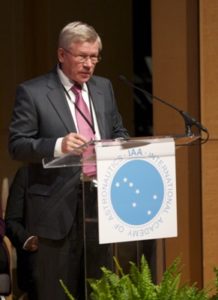
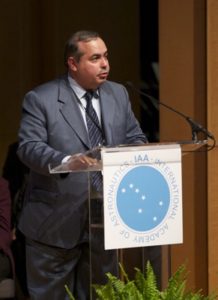
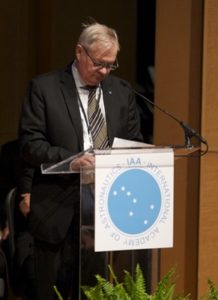
IAA Academician Anatoly Perminov, Director, Russian Federal Space Agency – H.H.Prince Dr. Turki Saud Mohammed Al-Saud, Vice President, Research Institute, Kingdom of Saudi Arabia – IAA Academician Yuri Alekseyev, Director General, Ukraine Space Agency NSAU – from left to right
IAA Academician Anatoly Perminov, Director, Russian Federal Space Agency: “Dear Mr. President, ladies, and gentlemen. I would like to elaborate a little on our priorities with respect to the four central topics listed in the declaration. First, human space flight: Our primary goal for the next decade is to provide effective use and to the fullest extent possible of the international space station’s capabilities for performing experimental space research and ensuring continuing human presence in space. We believe that moving in this direction will open new prospects for its pending international cooperation. Considering this fact, the Russian government has provided a resolution of support to the plan by the Russian Space Agency to expand the ISS lifetime until at least 2020…….Now No. 2, on planetary robotic exploration. During the next decade, Russia’s planning to implement a whole host of important, new space exploration projects, studying planets and various smaller bodies in the solar system….We fully support everything that has been said here along these lines already and in our judgment, of particular importance is the large-scale international project which we believe has very good prospects. Its implementation in conjunction with event of its international equivalence, such as GEOS and UN Spider, is well aligned with Russia’s stated four policy priorities”.
H.H.Prince Dr. Turki Saud Mohammed Al-Saud, Vice President, Research Institute, Kingdom of Saudi Arabia: “Distinguished guests, heads of space agencies, ladies and gentlemen, on behalf of the kingdom of Saudi Arabia, I would like to thank the International Academy of Astronautics for their kind invitation. I would also like to congratulate the academy for the 50th anniversary and convey our thanks for arranging a summit of 30 international space agencies and the preparation for the summit declaration. The topics that are emphasized by the summit declaration are among the realities that we have in the Saudi Arabian space program. In human spaceflight, Saudi Arabian astronaut, Prince Oba bin Salma, participated in the STS-51 mission launched 1985. We just celebrated, in Saudi Arabia, the 25th anniversary of the mission … Saudi Arabia plans to expand its participation in space missions in the future and welcome the declaration recommendations of joint missions….On climate change, the Kingdom of Saudi Arabia has contributed to research and development to mitigate the effects of climate change. Among these, we contributed $300 million philanthropic fund specifically for environmental studies….It has been our policy to share knowledge, experience, and capabilities with other international institutions to achieve a synergistic outcome, balancing priorities and global needs as clearly indicated in the summit declaration. Thank you”.
IAA Academician Yuri Alekseyev, Director General, Ukraine Space Agency NSAU: “Dear colleagues. On behalf of the National Space Agency of Ukraine, let me express my gratitude to everyone involved in discussions and preparations of the summit declaration and congratulate personally the leadership of IAA, President Dr. Nair and IAA Secretary General Dr. Contant. Welcoming this declaration demonstrates our strong willingness to jointly resolve global problems. I am pleased to say that provisions of the Declaration are broadly matching Ukrainian priorities in space activities. In particular, we pay substantial attention to the development of Earth Remote Sensing. Launching of Ukrainian ERS space craft “Sich-2” is planned for early December of the current year….Finally, I would like to emphasize that the National Space Agency of Ukraine highly appreciates the importance of international cooperation and coordination of the space activities, along with all the work performed in this area, which resulted in welcoming this significant historic Summit Declaration document. We are encouraging the International Academy of Astronautics to carry on with this initiative and we are ready to be engaged in this effort. Thank you very much”.
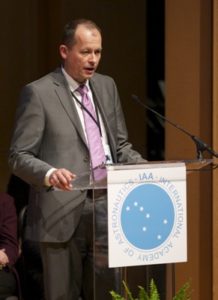
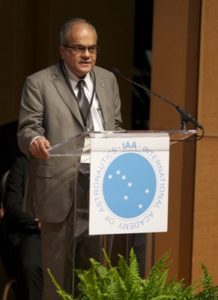
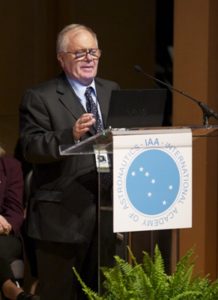
David Parker representing David Williams, Chief Executive, UK Space Agency – IAA Academician Ranganath Navalgund representing IAA Academician Koppillil Radhakrishnan, Chairman, Indian Space Research Organization ISRO – Dr. Conrado Varotto, Director Executive, Argentina Space Agency– from left to right
David Williams, Chief Executive, UK Space Agency: “I convey my greetings to you all. I do believe that this occasion is an unprecedented opportunity to illustrate the global importance and value of space activities for all mankind. The U.K. Space Agency warmly welcomes the summit declaration, which aligns well with our own U.K. space policy. We appreciate the IAA’s initiative and the hard work that has gone into preparing the document. Now the U.K. Space Agency is a new organization only created this year and yet it builds on more than 50 years of U.K. success in space activities. Today, the U.K. is a major user of space and provider of space technology and services to the world…..So in closing, my most important message is that we should take the hopes and dreams expressed in the summit declaration and work together to turn it into reality. I believe that we owe this to generations to come. My thanks to you all”.
Academician Koppillil Radhakrishnan, Chairman, Indian Space Research Organization ISRO: “Dear President, members of the IAA Board of Trustees, Heads of Space Agencies, distinguished academicians, and Secretary General of IAA, at the outset, let me complement the International Academy of Astronautics for organizing the Heads of Space Agency Summit, a seminal event to bring international synergy at the forefront of space exploration and space applications. The President and Secretary General of the Academy deserve accolades for conceiving the idea, setting up working groups, and finally, bringing out the reports as planned. To underlline importance to these initiatives, several of our ISRO experts contributed to the working groups….This is why ISRO welcomes the declaration brought out by the Academy with an executive summary of the recommendation of the four working groups for the consideration of the heads of space agencies. This will indeed be the beginning of an exercise for all of us. We would look at them with a national and international perspective and then adapt or adopt them, as the case may be”.
Dr. Conrado Varotto, Director Executive, Argentina Space Agency: “The Argentina Space Agency really welcome the declaration as proposed by the IAA, and what we can say that makes everybody happy – why we said that.? For those space agencies which has resources to go out for many hours in space, they say, “Go ahead.” To those space agencies that would like to do this but don’t have the resources the only way is international copoperation….Some years ago, there was a meeting organized by NASA. They put together many space agencies, looking for ways and means to develop better international cooperation, and there was a cloud. The cloud became thicker and thicker and thicker, and this cloud is idle. And that really, until we don’t find – I’m not talking about that, the law. The law may be very good. But until we don’t find a way to have desire to apply it a different way, it will be very, very difficult to really go ahead in real international cooperation. Thank you”.
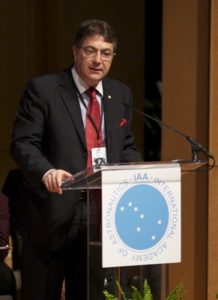
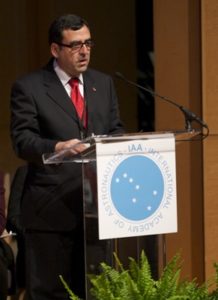
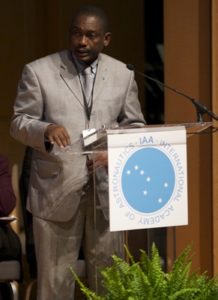
Dr. Carlos Ganem, President, Brazilian Space Agency – Dr. Juan Fernando, Director Executive, Chilean Space Agency – IAA Academician Seidu Oneila Mohammed, Director General, Nigerian National Space Research and Development Agency– from left to right
Dr. Juan Fernando, Director Executive, Chilean Space Agency: “Ladies and gentlemen, thank you to the IAA for the invitation to this historic celebration. As the Federal Director for the Chilean Space Agency, and especially to participate to the space agents submit for the celebration of 50 years of International Academy of Astronautics….Our country is a victim to frequent natural disaster. On February 27 in this year, we experienced one of the biggest earthquakes persistent in the human history, with a magnitude of 8.8 on Richter scale. Indeed this type situation, we received the love, the support of the international community…..More recent too, the task of the 33 miners trapped 700 meters below ground 69 days show us hope that space technology can help not only during natural disaster, but also in case of accident. During the miraculous operation, the Chilean Space Agency coordinate the NASA support and foreign aid come to Chile and integrated into medical team during three days in the same way of the disaster. We sincerely thanks to NASA for essential support….Finally, Chile agreed with the Summit, the declaration, and with the International Academy of Astronautics for including our country in this rare group invited to this important celebration… “
Academician Seidu Oneila Mohammed, Director General, Nigerian National Space Research and Development Agency NASRDA: “Nigeria Space Agency congratulates the International Academy of Astronautics to have organized this Heads of Space Agencies Submit on the occasion of its 50th anniversary and wish to welcome the IAA Summit Declaration….Nigeria from inception has indicated its support for disaster management through the constellation with other satellites and its membership to the charter. Since the launch of NigeriaSat-1 in 2003, the National Space Research and Development Agency (NASRDA) has supported numerous developments, such as using space technology in areas such as agriculture resource mapping, environment and disaster management….Nigeria supports the recommendations in the areas of climate change, especially the collaborations needed to deal with climate change at both local and global level. Our priorities are more in the areas of disaster management and climate change, due to our capacity and the immediate the needs of Nigerians and the African regions. We are also strengthening our capacity and our capabilities to delve into human spaceflight and planet robotic space explorations in the long-term…..For the meantime, we welcome collaboration in the areas of human spaceflight and robotic space exploration. NASRDA is supporting the IAA Heads of Space Agency Summit as a unique occasion to initiate discussions about international cooperation at such a broad level and we encourage the International Academy of Astronautics to ensure follow-on activities”.
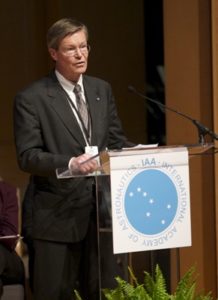
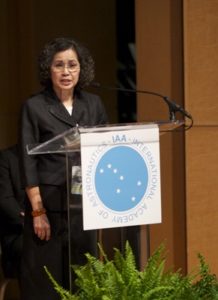
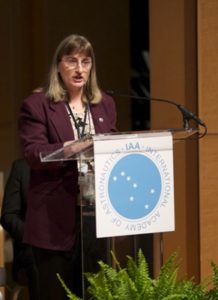
IAA Academician Geir Hovmork, Deputy Director General, representing Academician Bo Andersen, Director General, Norwegian Space Center – Dr. Darasri Dowreang, Director, National Space Agency of Thailand (GISTDA) – Mary Kicza, representing Jane Lubchenko, Administrator, National Oceanic and Atmospheric Administration NOAA– from left to right
Academician Bo Andersen, Director General, Norwegian Space Center: “We would like to congratulate the International Academy of Astronautics with its 50th anniversary. Over the years, the Academy has paid an increasing role on focusing essential topics on space activity, and bringing together individuals who can play a role in cooperating on the international arena to meet the challenges we are facing. We would also like to congratulate the Academy for arranging this Heads of Space Agencies Summit, Madhavan Nair, President and the IAA Secretary General – an event that might be one of the most important in the history of IAA so far. Members of the Academy as well as all the experts from all over the world have worked hard to present to us here in the Summit Declaration. And on behalf of the Norwegian Space Center, I’m pleased to warmly welcome this Declaration, covering areas of great importance, but all relying on extensive international cooperation to maximize the benefit for humanity”.
Dr. Darasri Dowreang, Director, National Space Agency of Thailand (GISTDA): ” Mr. Chairman, distinguished delegates, it is my great honor to be part of this historical event of the Summit of Heads of Space Agencies. I’d like to take this opportunity to congratulate the International Academy of Astronautics for their remarkable initiative and excellent work in preparation for the Summit. We do appreciate your effort in putting together the most essential elements for international cooperation and coordination, in four important areas, namely climate change and green systems, disaster management and natural hazards, planetary exploration and human spaceflight. The Thai delegation fully supports such initiative and welcome the Summit Declaration. Thailand is at a very young stage of development in terms of space technology amongst space-faring countries. Our major activities are currently focusing on utilization of space-borne data for monitoring and management of our resources, as well as for disaster monitoring and management. In Thailand, the types of natural disasters include droughts, floods, landslides, and wildfires. Floods and landslides in particular have killed a large number of victims and also caused damages to their houses and properties, including agricultural land”…
Jane Lubchenko, Administrator, National Oceanic and Atmospheric Administration: “NOAA endorses and strongly supports the IAA Heads of Space Agencies Summit Declaration with respect to both Climate Change and Disaster Management. As an operational space agency, NOAA provides sustained observations through both polar and geostationary satellites. Many of the sensors flown on our satellites relate directly to meeting the needs of the Essential Climate Variables identified by the Global Climate Observing System (GCOS). We will be flying advanced climate sensors over the next few years on the upcoming NPOESS Preparatory Project (NPP) and follow-on Joint Polar Satellite System (JPSS) series of satellites. Together with EUMETSAT we operate the Interim Joint Polar System, involving our polar satellites and EUMETSAT’s MetOp satellite series. We are providing operational altimetry observations through the Jason series of satellites in cooperation with EUMETSAT, CNES, NASA and eventually ESA. We fly the CNES Argos data collection system on our polar satellites and are involved with France, Canada and Russia in the Cospas-Sarsat Search and Rescue System. And we benefit greatly from receiving data from a number of Earth observation satellite operating agencies….In summary, NOAA is fully engaged in both Climate Change and Disaster Monitoring activities and we fully support the IAA Summit Declaration’s recommended actions in these critical areas.”
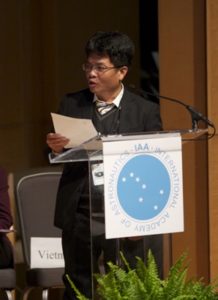
Pham Anh Tuan representing Prof. Chau Van Minh, President, Vietman Academy of Science and Technology
Prof. Chau Van Minh, President, Vietman Academy of Science and Technology: “The Vietnam Space Program started in 1980 in cooperation with Russia. After 20 years of sleeping we re-started our space program again in 2006. The Vietnam government approved, so Vietnam Space Program is outlined until 2020…..Vietnam is one also country that have heavy influence by global climate change. In fact, flat soil erosion, typhoon, and hurricane have destroyed many house – village, hurt and killed a great number of our people… We hope to enhance a corporate relation with many other nations within the project cooperation program, bring many new man resources in major space technology…. The Vietnam Academy of Science fully supports the IAA Summit Declaration. I take opportunity to invite all the Head of Space Agencies and all of you, come to Vietnam. With all of you, explore space, explore Vietnam. Thank you very much”.
Gerardo Ferrando, Member of the Governing Board, Agencia Espacial Mexicana (AEM): “The Mexican Space Agency (AEM) thanks the International Academy of Astronautics for its invitation to attend the Heads of Space Agency Summit, a historic event that promotes international cooperation in a unique way.At this time, Mexico is welcoming to establish international space policy. The four main topics identified by the IAA will be an important reference. The Mexican Space Agency AEM will follow up the IAA activities and hopes that the conclusions of the Space Agency Summit leads to build close and strong results among all countries and individuals – convince that space issues should benefit the good use of science and technology for the development of mankind”.
Prof. Mikhail V.Myasnikovich, Chairman NASB, Belarus: ” On behalf of the National Academy of Sciences of Belarus and the National Russian Council on Space, I sincerely greet all the participants of Washington Summit of Chairmen of National Space Agencies and congratulate you with 50th anniversary of International Academy of Astronautics. I’d like to express our great appreciation to the International Academy of Astronautics on the invitation you sent to our address to take part in this Jubilee Summit. The National Academy of Sciences of Belarus supports the Declaration of the International Academy of Astronautics to constantly date the international cooperation for the decision of global contemporary problems. Our National Program of the research on peaceful use of space is under successful accomplishment. Currently, the first Belarusian satellite of remote sensing is already built and is ready to be launched. The appropriate land-based infrastructure is created. The National Belarusian Council on Space will try to take part in future coordinated events of the International Academy of Astronautics, and in a real support, there’s scientific and engineering decisions stated in the declaration. We wish the members of this summit fruitful activity and hope for future cooperation”.
Academician Joo-Jin Lee, President KARI, South Korea: “I first congratulate the International Academy of Astronautics on their 50th anniversary and express my sincere thanks for organizing the summit meeting with 30 heads of space agencies from around the world. The world we live in is very different from the days that the IAA was first established and I believe the founding members of the IAA would never have imagined that so many countries, including the Republic of Korea, would become so actively involved in space activities. As such, I think the meeting provides us a valuable opportunity to realize how much the space community has grown and to meet together our efforts for further space endeavors of humankind on a global scale, which is why I welcome and support on behalf of KARI the IAA summit declaration presented to us today. KARI’s present and future plans dictate active involvement in all four areas mentioned in the declaration, though of somewhat different level, and KARI looks forward to close cooperation in these areas with the space agencies present here today. KARI is committed to a peaceful use of outer space for the benefit of all humankind and hopes that the IAA summit declaration made today can reinforce the commitment and bring forth a new global era in space. I then express my appreciation for the dedicated effort of the IAA in organizing this summit meeting and wish the best of success for all heads of space agencies.
SUMMIT STEERING COMMITTEE
Summit Management:
In order to prepare the Summit, a Steering Committee was established to address program management and logistics.
Chair:
Dr. Madhavan Nair, IAA President
Summit Coordinator:
Dr. Jean-Michel Contant, IAA Secretary General
Co-Chair Steering Committee:
Mrs. Corinne Jorgenson, President, Advancing Space
Mrs. Mary Snitch, Director, Lockheed Martin Corporation
Summit Program Manager:
Mrs. Corinne Jorgenson, President, Advancing Space
Summit Steering Committee Members:
Mr. Brian Duffy, Vice President, Space Systems, Lockheed Martin Corporation, USA
Mr. Max Grimard, Vice President, Deputy Head Strategy & Business Development, EADS Astrium, France
Prof. Koichi Ijichi, Managing Director, Institute For Unmanned Space Experiment Free Flyer, Japan
Prof. Seishiro Kibe, Director Innovative Technology Research Center, ARD, Japan Aerospace Exploration Agency, Japan
Dr. Shri Koteswara Rao, Astronautical Society of India, India
Dr. Karlheinz Kreuzberg, Head Director General’s Cabinet, European Space Agency
Mr. John Mankins, President, Artemis Innovation Management Solutions, USA
Prof. Keiken Ninomiya, Professor Emeritus, Japan Aerospace Exploration Agency, Japan
Prof. Dr. Yury Razoumny, Professor, Bauman Moscow State Technical University, Russia
Prof. Kuninori Uesugi, Professor Emeritus, ISAS/ Japan Aerospace Exploration Agency, Japan
Dr. Oleg Ventskovsky, Director, Yuzhnoye SDO European Representation, Ukraine
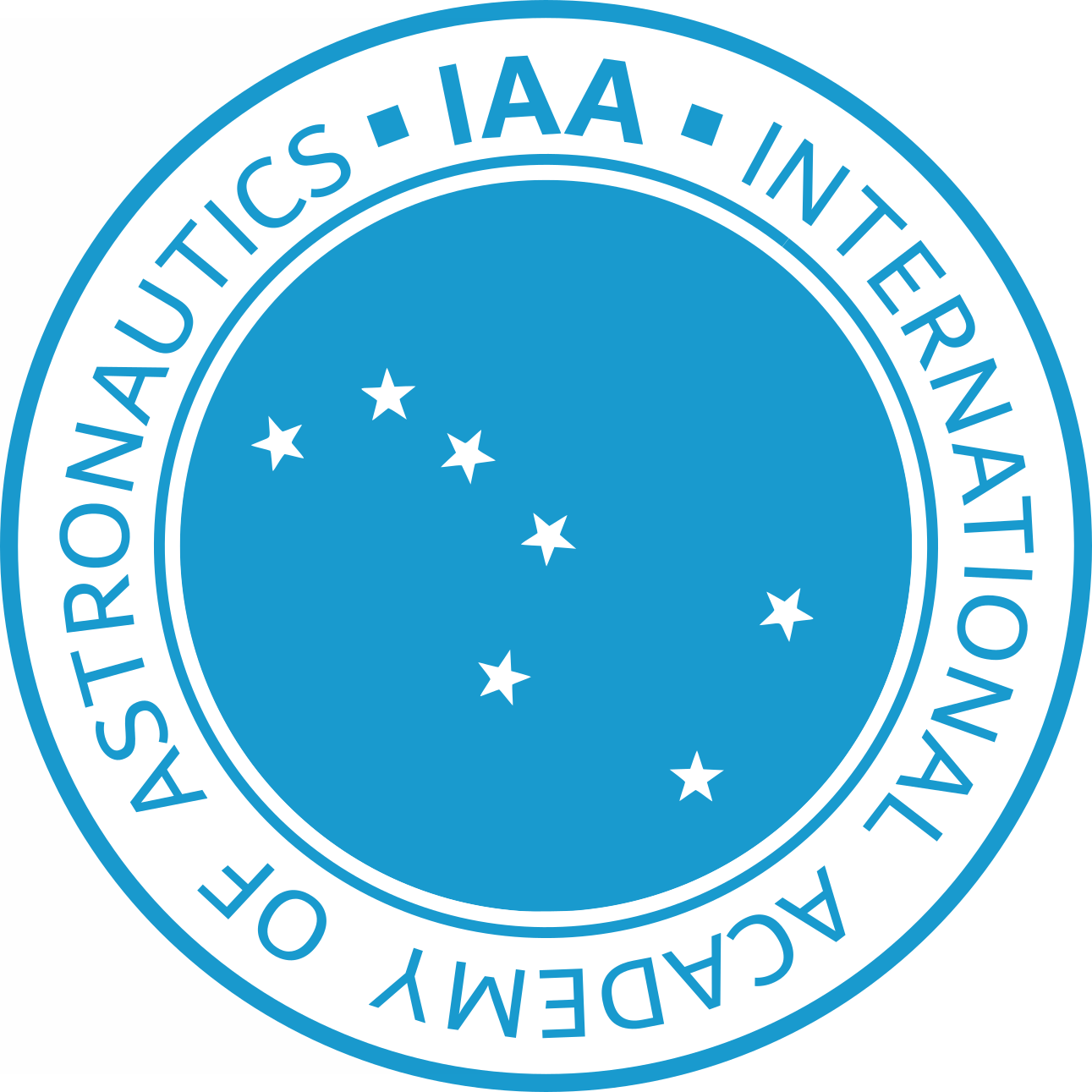
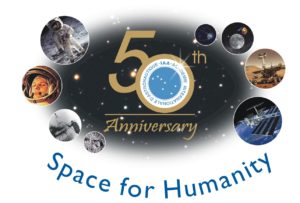
 Gala at the Ronald Reagan Building and International Trade Center
Gala at the Ronald Reagan Building and International Trade Center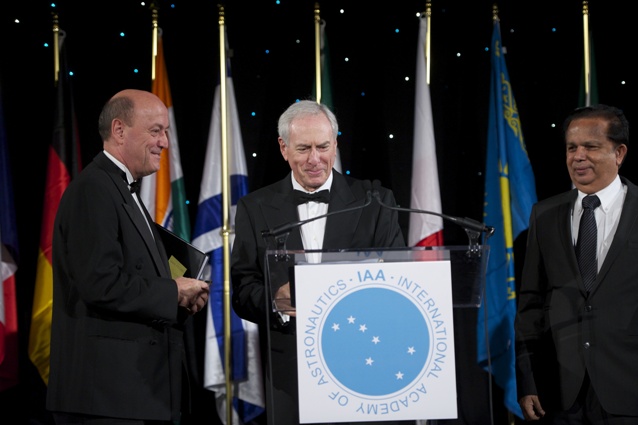 Presentation of Trophies to the Heads of Agencies by the Master of Ceremony
Presentation of Trophies to the Heads of Agencies by the Master of Ceremony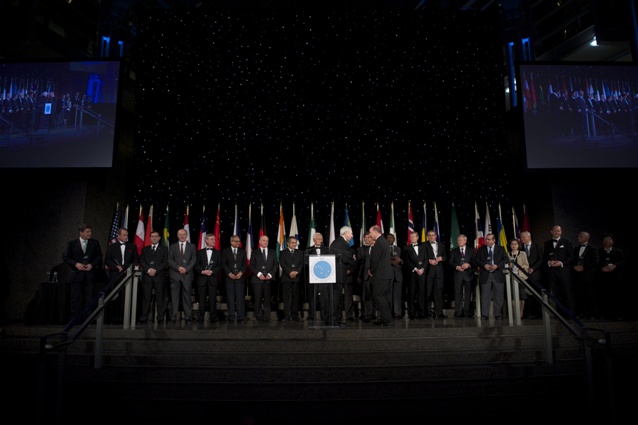 Heads of Space Agencies Ceremony during the Gala Dinner
Heads of Space Agencies Ceremony during the Gala Dinner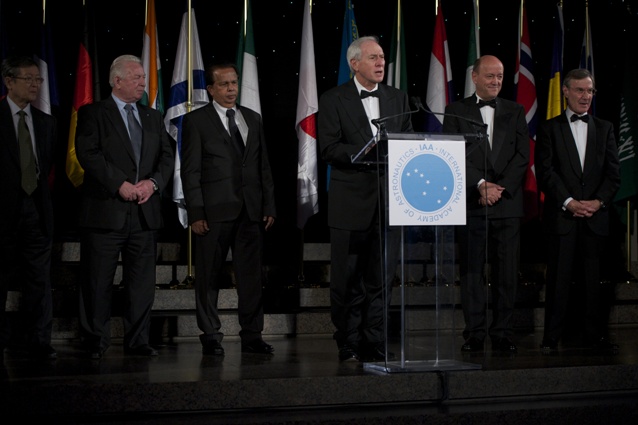 IAA Officers
IAA Officers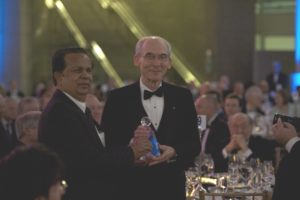
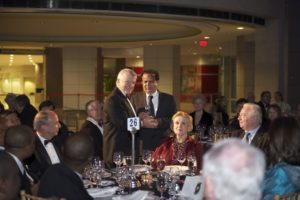
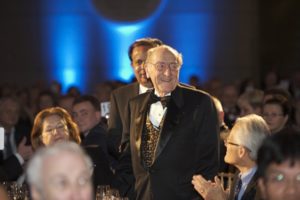
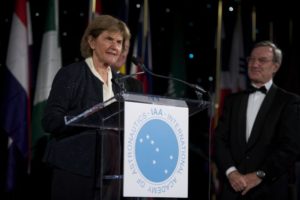
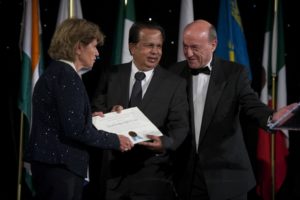
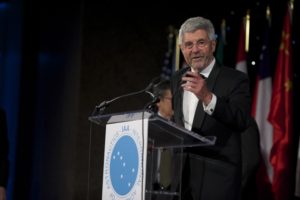
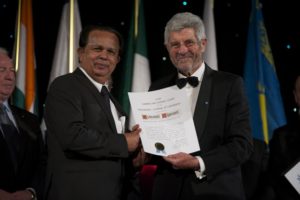
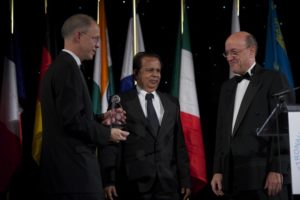
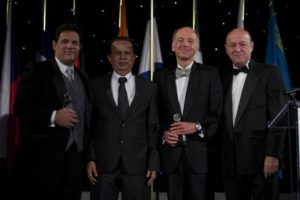
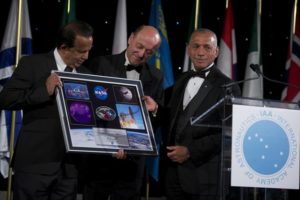
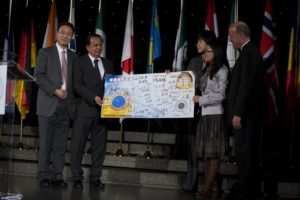
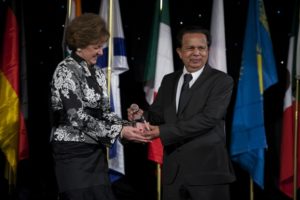
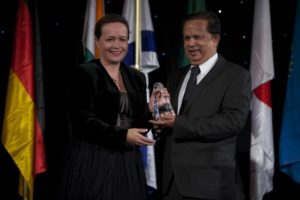
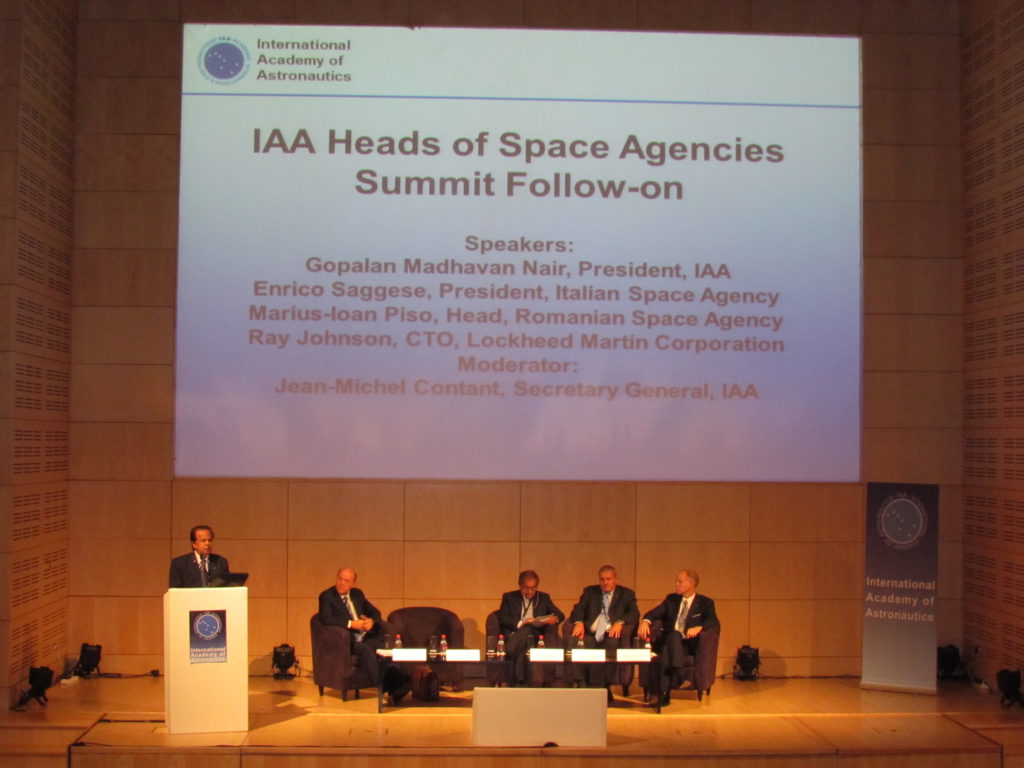
 Official Media Sponsor
Official Media Sponsor